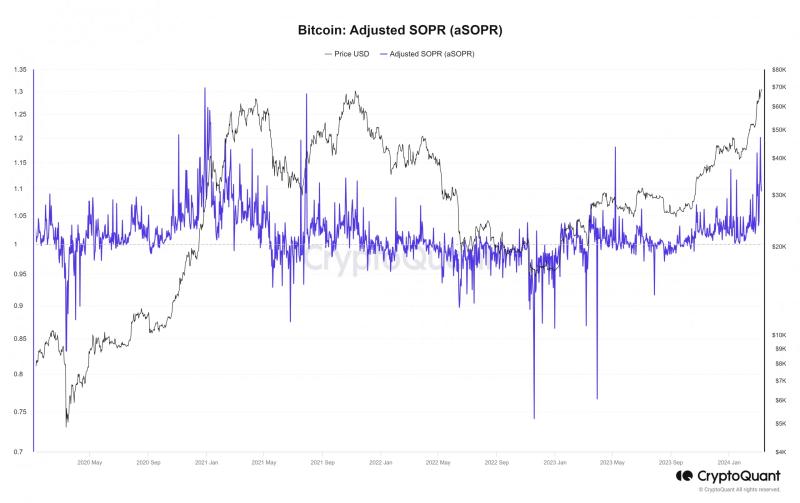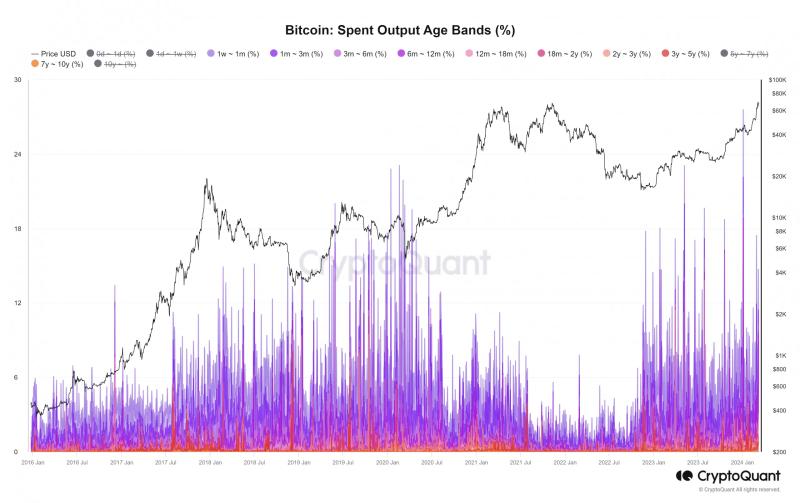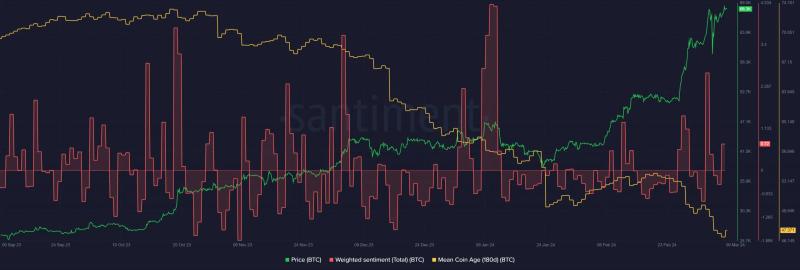There is increased selling activity among younger coins, while the older ones have stayed put.

Edited By: Saman Waris
- Combining the spent output metrics showed increased short-term trader activity.
- Long-term holders’ conviction in Bitcoin did not waver in the past three weeks.
Assessment of Bitcoin’s [BTC] on-chain metrics showed that short-term traders were selling at a profit.
The price was reached above its previous $69k ATH to set a new one at $69,990, based on TradingView data sourced from Binance.
Analysis of CryptoQuant data revealed some interesting trends in the spent output metrics.
AMBCrypto noted that long-term holders did not sell significantly in the past month and that a large price correction was not imminent.
Delving into the short and long-term holders’ activity
An analyst on CryptoQuant examined the Bitcoin bull and bear trends since January 2018 using the adjusted Spent Output Profit Ratio (aSOPR) metric. This metric is a variant of the spent output profit ratio.
The key difference is that the UTXOs with an input-output span of less than an hour are excluded from the aSOPR.
This is done to reduce the noise from the short-lived UTXOs and provides a clearer picture of what BTC holders are doing. Trading activity is filtered out this way.

They found that the average duration of the growth periods is 235 days. The growth period is when the aSOPR is above 1. At press time, we are 140 days into the cycle.
This meant that the next 100–150 days could see Bitcoin find a local top, if not this bull run’s top.
This is no guarantee, nor is it financial advice, but it is worth examining more closely. AMBCrypto combined the findings from the aSOPR with spent output age bands.
This was done for a better understanding of whether short-term and long-term holders were selling.
Younger Bitcoins are being sold

The age bands above showed that the long-term holders (18-month-old to 5-year-old BTC) saw a spike in spent outputs in mid-January. This was followed by a price correction for Bitcoin from $49k to $38.5k.
Not every such movement needs to be followed immediately by a price reaction. Yet, the past few times have seen a response, although some delay was possible.
This occurred in July 2023, when prices began to plummet two weeks after the surge in spent output for the older age bands.
In the past six weeks, the 18-month and older bands did not see a lot of spent output activity. Yet, we noted the aSOPR has trended higher. The inference was that short-term traders were selling at a profit.
However, traders and investors need not worry about a major price correction like mid-January right now.

Santiment data on the Weighted Sentiment showed that the past two weeks saw strong positivity around BTC. This was understandable, given the proximity to all-time highs.
A point of concern was the downtrend on the mean coin age. This showed a distribution phase in progress throughout the network.
How much are 1, 10, or 100 BTC worth today?
The declining mean coin age along with the rising aSOPR once again pointed to short-term holders selling at a profit.
Since these coins are likely younger (based on the spent output age bands) investors need not fear a large price correction.

